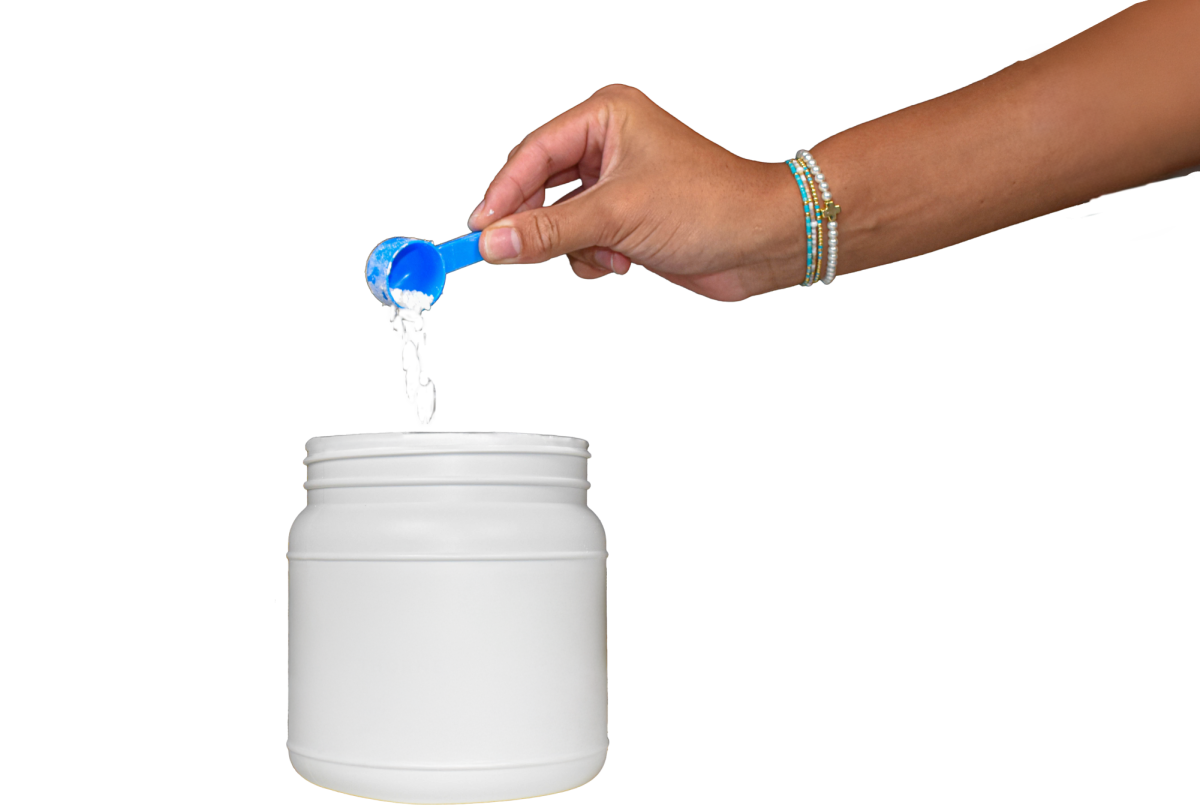It is not a hydration drink. It is not a protein bar. It is a scoop of white powder found in water bottles at sports practices: creatine.
Creatine is a naturally occurring compound found in proteins like red meat, chicken and fish, but it is more commonly used to enhance athletic performance. The body naturally produces creatine and stores it in muscles, creating a quick source of energy during high-intensity activities.
Because of its effects on muscle growth, recovery and cognitive benefits, the supplement has rapidly surged in popularity, with sales increasing 183% over the past 2 years, according to Nutritional Outlook. The supplement also helps with muscle contraction and blood circulation too, making it desirable for all athletes looking to get an edge.
Coming in various forms from powder to chewables to liquids creatine monohydrate is the most used version of creatine among athletes. Athletes like varsity quarterback Joe Macau take the supplement because of its long term effects on muscle growth.
Macau’s play style has been affected by creatine. Macau is able to play with more physicality than before taking it.
“I started using creatine for the first time this summer,” Macau said. “I began creatine only being able to squat 135 pounds. After
(taking) creatine for a few months, I now can squat 205 (pounds).”
Muscle development takes time and work; so some inflation of the muscles may be a visual effect, caused by the water being absorbed into them.
Its benefits are not limited to just physical appearance and performance; it also helps with post-performance as well. A study published by Biomed Central found that athletes who took creatine experienced faster recovery of muscle soreness after exercise.
“(Creatine) definitely helps with relaxing the muscles and recovery,” Wilson said. “It’s not a full on protein where it’s going to help you to build muscle, but it is a type of amino acid that can help with that sports recovery when taken at the proper dosage.”
Creatine does not exclusively help athletes physically. In addition to muscles, the brain also stores creatine, which, with additional creatine supplement, can help the body improve cognition and memory. Demographics including the elderly are consumers of creatine because of its role in maintaining brain function with age.
While creatine is helpful, it is important to understand the proper way in which athletes should use it. Athletes must hydrate in order to account for all the water being pulled into the muscles by creatine. A lack of hydration can lead to cramping, dehydration or tremors.
American golfer Ben Griffin experienced an unexpected episode during the final round of the 2025 BMW Championship. Prior to starting his round, Griffin consumed 15 grams of creatine, three times the recommended dosage of 5 grams. Griffin additionally did not follow his dosage with sufficient amounts of water. Shortly after, he began to feel extremely shaky and experienced tremors.
“There’s only so much (creatine) the body can take,” Wilson said. “When you’re taking supplements in high doses, you’re putting your body at risk. It affects your muscle’s response to the neurological signal your brain shoots off. Your body can’t respond that
fast, so your body is going to go into a spasm, which you experience as tremors.”
Griffin’s dosage placed an additional strain on his kidneys, which are necessary for filtering waste products in the blood stream. Even in healthy athletes, an overload of creatine temporarily overworks the kidney.
“The recommended dosage is about 3 to 5 grams,” Wilson said. “When you’re under 18, you’re still in your growth and development stage, (where-as) someone that’s a little bit (bigger), who (is) kind of past that stage can use a little more. Under 18 (grams), the dosage can vary based (on) size and protein consumption.”
With both positive and negative effects, creatine has quickly become one of the most polarizing supplements on the market. Although athletes can reap many benefits, those benefits may be nullified if the supplement is not taken in moderation or with proper hydration.
“Be smart about using creatine,” Wilson said. “It could be your best friend or your worst enemy.”
















